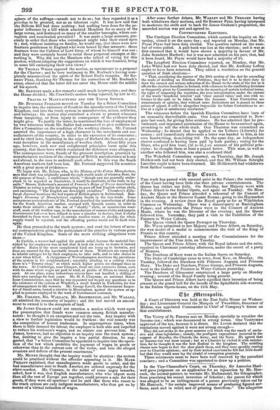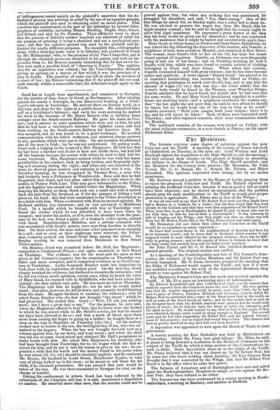ZbE .ftittropolis.
A Court of Directors was held at the East India House on Wednes- day; and Lieutenant-General the Marquis of Tweeddale, Governor of Madras, was appointed Commander in Chief of Company's forces on that establishment.
The Vestry of St. Pancras met on Monday, specially to consider the Income-tax ; which was denounced in strong terms. One Vestryman approved of the tax, because it is direct. Mr. Lovett declared that the resolutions moved against it were not strong enough— They did not strike at the great monster evil which was the result of exclu- sive and class legislation ; namely, the profligate expenditure incurred in the support of Royalty, the Church, the Army, and the Navy. He agreed that an Income-tax was most unjust ; but as a Chartist he viewed it with satisfac- tion, for be thought it was the best Radical in the kingdom. The middling classes now began to feel the shoe pinch them, and they were speedily coming over to Chartist opinions; and by their united exertions he felt but little doubt but that they would soon lay the citadel of corruption prostrate.
These sentiments seem to have been well received by the parochial conclave ; and a Committee was appointed to draw up a petition.
In the Vice-Chancellor's Court, on Thursday, Sir Lancelot Shad- well gave judgment on an application for an injunction by Mr. Han- cock, the animal-painter, to restrain Mr. Hullmandel, the lithographer, from practising his recent invention of lithotint ; the patent for which was alleged to be an infringement of a patent previously taken out by Mr. Hancock, "for certain improved means of producing figured sur- faces, sunk and in relief, and of printing therefrom." The allegation
of infringement rested mainly on the plaintiff's assertion that the de- fendant's process was printing in relief by the use of an aquatint ground, which the plaintiff also used in obtaining relief on metal plates. This assertion was contravened on the part of the defendant by several litho- graphers of celebrity, including Messrs. Harding, Haghe, Boys, Gauci, and Scharf, and also by Dr. Faraday. Their affidavits went to show that the process of lithotint neither required nor admitted of relief for the purpose of printing, it being a chemical and not a mechanical pro- cess; and that the aquatint ground was used by the plaintiff and de- fendant for totally different purposes. To exemplify this, a lithographic stone, with a drawing made upon it in lithotint, was produced in Court by Mr. Hullmandel ; who, in the presence of the Vice-Chancellor, put it through the chemical processes described in his patent, and took an im- pression from it ; his Honour jocosely remarking that he had never be- fore seen such a peculiar kind of "drawing in Equity." The applica- tion for an injunction was refused; but the Vice-Chancellor declined giving an opinion on a matter of fact which it was the province of a jury to decide. The question of costs was left to abide the decision of a court of law ; his Honour intimating, that if the plaintiff did not seek such remedy within a reasonable time, the defendant might apply to the Court.
Good has at length been apprehended, and committed to Newgate, for the murder of Jane Jones or Good, at Roehampton. After eluding pursuit for nearly a fortnight, he was discovered working as a brick- layer's labourer at Tunbridge. He arrived there on Sunday week, in a fish-van, and slept for the night at a public-house. He described him- self as a bricklayer's labourer ; and early the next morning he applied for work to the foreman of Mr. Henry Barrett, who is building some cottages near the South-eastern Railway. He gave his name as Con- nor ; and in answer to some questions which were put to him, he said that he had been a bricklayer's labourer for eighteen years, and had been working on the South-eastern Railway for fourteen days. He was accepted, and he was found to be a good workman. He avoided communication with his fellow workmen, and returned abrupt answers to any questions which were put to him. On one occasion he addressed one of the men in Irish; but he was not understood. On getting work, Good took a lodging in the house of a Mrs. Hargreave. He told her that he had been a hawker and dealer in hare and rabbit skins, but had left off the business because the person with whom he used to deal had be- come insolvent. Mrs. Hargreave noticed while he was with her many peculiarities in his conduct, such as being restless, and frequently sigh- ing and moaning during the night ; and when any one knocked at the door, he showed great anxiety and curiosity to know who it was. On Saturday morning, he was recognized by Thomas Rose, a man who had formerly been a Policeman at Wandsworth. Rose said that he had frequently seen Good, and had often asked him for a light when in the stables in Putney Park Lane. This man gave information to the Police, and the fugitive was seized and carried before the Magistrates. While denying his identity to them, Good took out a comb and with it turned back the hair from his forehead, as if for the purpose of hiding a bald place on his head: this had been mentioned in the Police description to be a habit with him. When confronted with Rose he seemed agitated. He declined making any statement ; and he was conveyed to Maidstone Gaol. In a bundle which he brought with him to Tunbridge were found the clothes which he was described to have worn when be escaped; and under his jacket, as if to save the shoulder from the pres- sure of the hod, was found a piece of a woman's calico apron, stained with blood. Superintendent Malalieu, and a private constable who was acquainted with Good's person, were sent from London to identify him. On their arrival, the man and some other prisoners were sleeping in a cell ; and as soon as their nightcaps were removed, the Police- man instantly pointed out Daniel Good from among the others. On Sunday evening he was removed from Maidstone to Bow Street Police-station.
On Monday, Good was examined before Mr. Hall, the Magistrate ; remanded to Clerkenwell Prison ; and again examined at Bow Street on Thursday. The evidence was for the most part the same as that given at the Coroner's inquest; but the examination on Thursday was fuller and more complete, and it comprised evidence as to Good's cap- ture at Tunbridge. Lydia Susannah Butcher made her deposition on both days with an expression of violent grief. On the first day, Good closely watched the evidence, but declined to examine the witnesses ; and he did not evince much agitation, except once, when he heard the voice of Mary Good, his reputed wife in Spitalfields, who had been taken into custody—he then turned very pale. He was more moved on Thursday. The Magistrate told him he might sit; but he said he would rather stand : soon after, however, he did sit down, and presently he fell fainting from his chair. He again declined to examine the witnesses ; only he asked Susan Butcher why she had not brought "the shawl" which be had given her. She denied this. Good—" Well, I'll ask you nothing more ; but I have a great deal to say." For the present, be only said, when the Magistrate offered to hear him, that he never wore the clothes in which he was seized while in Mr. Shiell's service, for that he should not have been allowed to do so ; and that a mark of blood upon them arose from cutting his finger in going up a ladder : he bought them at a shop on the way to Deptford, on Thursday [the 7th.] All his anxiety seemed now to centre in his son, the intelligent boy often, who was ex- amined at the inquest. When the boy was brought forward now as a witness against him, he sat down, and wept much ; and when the child was led out of court, Good asked and obtained Mr. Hall's permission to shake hands with him. He asked Mrs. Hargreave, his landlady, who had been brought from Tunbridge, for 9s. 6d. wages which she had re- ceived for him, and he put it into his bosom to give to his son ; he ex- pressed a wish that his watch and the money found in his purse when he was taken (3/. 17s. 6d.) should be similarly applied ; and he cautioned Mr. Brown, his landlord in South Street, Manchester Square, to take care of things locked up in his room ; as he meant to sell them for his child, if he obtained permission. He was assured that care would be taken of the boy. He was then committed to Newgate for trial, on the charge of murder. During his confinement in prison, Good has been softened by the exhortions of the Chaplain, and has, it is said, manifested a disposition to confess. He observed more than once, that the murder could not be proved against him; but when any striking fact was mentioned, he shrugged his shoulders, and said, "Yes, that's strong." One of the first things he asked for, on Sunday night, was a softer bed to sleep on. He was advised to procure the wages due from Mr. Shiell, that he might employ counsel ; but he said he thought that the county ought to allow him legal assistance. He expressed a great horror at the idea that his body would be given out for dissection I and he was comforted with the assurance that it might be buried and covered with quick-lime. Mary Good, to whose house, in Flower and Dean Street, Spitalfields, he was traced the day following the discovery of the murder, and Gamble, a neighbour of hers, were seized on Monday, and examined at Bow Street. The woman, since Good's visit to her on the 7th, has kept her house closed against all inquirers. Gamble, an Irishman, was seen frequently going in and out of her house ; and on Saturday morning, he took a bundle with him, which was since found to contain articles of clothing belonging to Good and Jane Jones. When taken into custody, Gamble conducted himself with great violence ; but he has since become sullen and apathetic. A letter signed "Daniel Good," but proved to be in Gamble's handwriting, was received by Mr. Shiell on Friday, re- questing that gentleman to watch over Good's boy, and to pay him the amount of wages (71. 10s.) that was due : the letter added, that the writer's body would be found in the Thames, near Waterloo Bridge. Gamble admitted that he knew Good, but denied that he had seen him for some weeks. He and Mary Good breakfasted together in a public- house one morning lately ; and a neighbour overheard the woman say, that "the last night she saw poor Dan, he said he was afraid he should be taken, but he would keep out of the way as long as he could." Gamble answered," Hold your tongue, hold your tongue; leave it to me, and he will never be taken." Both of them were remanded until Thursday ; and after repeated remands, their next examination stands for Monday.
The mutilated remains of the woman were buried on Friday, with the usual religions ceremonies, at a new church in Putney, on the upper Richmond Road.



























 Previous page
Previous page